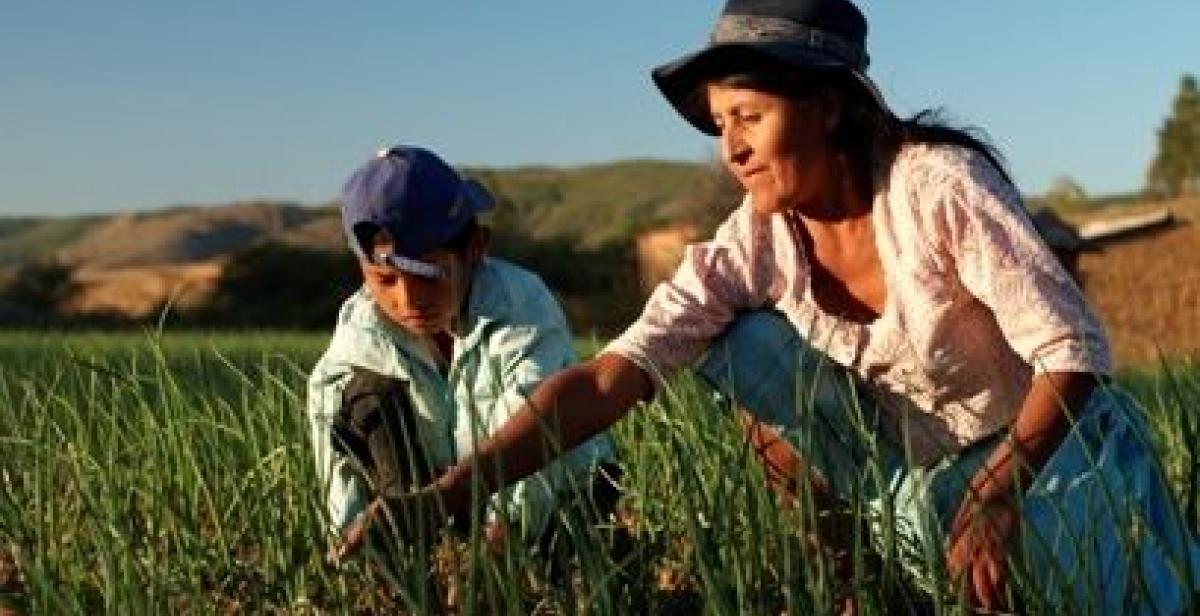Maria Yolanda, 35, is a small-scale farmer living in Antioquia in the Peruvian Andes. Her hopes for “a good future for my children, in a healthy environment” echo with those of billions of us around the globe.
But Maria Yolanda is worried about the water resources that will be available to her in the future. “This is something that keeps us all worried. We hear about climate change and we know there is a lot of pollution of our water as well,” she says.
The way the water resources available to the planet’s population are used is a key issue facing negotiators in the lead up to the UN Rio+20 Earth Summit.
Strong commitment needed
In June this year, world leaders will meet in Rio de Janeiro, Brazil, to put their heads and hearts together to agree on future approaches to sustainable development. It's a milestone opportunity to make a united global commitment to use the planet's resources wisely, so as to meet the needs of current and future generations.
So in preparation, governments, civil servants, scientists, engineers, NGOs, policy makers, businesses, activists and environment geeks all over the world are in the process of negotiating what that agreement might look like. And at Progressio, we've been putting forward the points of view of the people we work with too, especially concerning water resources.
The Zero Draft, released by the UN in mid-January after considering thousands of submissions, gives a preliminary indication of what the summit hopes to deliver. But there is further to go to turn promises into reality and to make sure there is no compromise on ensuring poor and marginalised people have access to the water they need for livelihoods.
Focus on water
Thankfully for Maria Yolanda and billions of others like her, the water challenges we face have finally been recognised and are specifically treated as a cross-cutting issue in the Draft - meaning that water is seen as crucial to achieving gains in all areas of development, from drinking water, sanitation and maternal and child health through to dealing with the consequences of environmental degradation and climate change.
“We are encouraged that water issues have been given priority and are recognised as a challenge underpinning all areas of development,” says Daniel Hale, Progressio’s Campaigns Officer. “But the task now is to turn rhetoric into reality – we need a strong global commitment to turn this Draft into change we can be proud of.”
People's participation is crucial
The Zero Draft emphasises the importance of ensuring the “participation of all concerned citizens” and highlights that of mountain peoples and others who are poor and marginalised in decision-making. For Maria Yolanda, this is an encouraging start point for the negotiations.
She has been working with Progressio partner, Aquafondo, to have her voice heard at a higher level:
“Aquafondo gives small water users an equal voice in the management of our water shed. Because for now, it’s the big companies and the State who make all the decisions and we do not even know about what they decide,” she says.
Fair access to water
Maria Yolanda has experienced mismanagement of water resources first hand and laments the inefficient and abusive use of water by both big companies and by farmers.
“Without water the people, animals and crops cannot live. If we didn´t have water for irrigation, we would have to depend on the rainy season and would only be able to harvest once a year, which would mean less income for my family,” explains Maria Yolanda.
Women as water managers
And Maria Yolanda is by no means alone in her struggle to get fair access to water. Often women are the ones in charge of managing water for domestic use and for watering home-grown crops to feed their families and generate income.
“While the Draft does highlight women’s roles in being drivers of sustainable development, we’d like to see it go a step further and specifically mention women as water managers,” explains Daniel Hale.
As negotiations over the nitty-gritty language of the Draft continues, the bottom line is that there’s more work to be done to ensure that the UN Rio+20 Earth Summit will be meaningful, consequential and relevant.
Take action now!
Get involved by urging your MP to back Rio+20.
Photo: Maria Yolanda and her son, Eduardo, tend their crops in Antioquia, Peru (photo © Thomas Mueller/SPDA)



